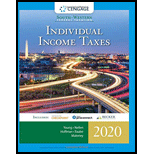
Individual Income Taxes
43rd Edition
ISBN: 9780357109731
Author: Hoffman
Publisher: CENGAGE LEARNING - CONSIGNMENT
expand_more
expand_more
format_list_bulleted
Question
Chapter 14, Problem 10DQ
To determine
Identify and explain the relevant tax issue that is faced by Person R while making the decision.
Expert Solution & Answer
Want to see the full answer?
Check out a sample textbook solution
Students have asked these similar questions
HELP
General accounting question
For the current year, Patterson Company incurred $218,000 in actual manufacturing overhead cost. The Manufacturing Overhead account showed that overhead was overapplied in the amount of $16,500 for the year. If the predetermined overhead rate was $11.75 per direct labor hour, how many direct labor hours were worked during the year?
Chapter 14 Solutions
Individual Income Taxes
Ch. 14 - Prob. 1DQCh. 14 - Prob. 2DQCh. 14 - Prob. 3DQCh. 14 - Prob. 4DQCh. 14 - LO.1 Taylor is negotiating to buy some land. Under...Ch. 14 - Prob. 6DQCh. 14 - Prob. 7DQCh. 14 - Prob. 8DQCh. 14 - Prob. 9DQCh. 14 - Prob. 10DQ
Ch. 14 - Prob. 11DQCh. 14 - Prob. 12DQCh. 14 - Prob. 13DQCh. 14 - LO.4 Marilyn owns land that she acquired three...Ch. 14 - Prob. 15DQCh. 14 - Prob. 16CECh. 14 - Prob. 17CECh. 14 - Prob. 18CECh. 14 - Prob. 19CECh. 14 - Prob. 20CECh. 14 - Heather owns 400 shares of Diego Corporation...Ch. 14 - Prob. 22CECh. 14 - Prob. 23CECh. 14 - Prob. 24CECh. 14 - Prob. 25CECh. 14 - Prob. 26CECh. 14 - Prob. 27CECh. 14 - LO.1 Anne sold her home for 290,000 in 2019....Ch. 14 - Prob. 29PCh. 14 - Prob. 30PCh. 14 - Nissa owns a building (adjusted basis of 600,000...Ch. 14 - Prob. 32PCh. 14 - Prob. 33PCh. 14 - Prob. 34PCh. 14 - Prob. 35PCh. 14 - Yancys personal residence is condemned as part of...Ch. 14 - Prob. 37PCh. 14 - Prob. 38PCh. 14 - Kevin purchases 1,000 shares of Bluebird...Ch. 14 - Prob. 40PCh. 14 - Prob. 41PCh. 14 - Prob. 42PCh. 14 - Nicky receives a car from Sam as a gift. Sam paid...Ch. 14 - Prob. 44PCh. 14 - Prob. 45PCh. 14 - Prob. 46PCh. 14 - Prob. 47PCh. 14 - Prob. 48PCh. 14 - Helene and Pauline are twin sisters who live in...Ch. 14 - Prob. 50PCh. 14 - Prob. 51PCh. 14 - Prob. 52PCh. 14 - Prob. 53PCh. 14 - Prob. 54PCh. 14 - Prob. 55PCh. 14 - Prob. 56PCh. 14 - Alton Newman, age 67, is married and files a joint...Ch. 14 - John Benson, age 40, is single. His Social...Ch. 14 - Prob. 1RPCh. 14 - Prob. 2RPCh. 14 - Prob. 5RPCh. 14 - Prob. 1CPACh. 14 - Prob. 2CPACh. 14 - Prob. 3CPACh. 14 - Prob. 4CPACh. 14 - Prob. 5CPACh. 14 - Prob. 6CPACh. 14 - Prob. 7CPACh. 14 - Prob. 8CPACh. 14 - Prob. 9CPA
Knowledge Booster
Learn more about
Need a deep-dive on the concept behind this application? Look no further. Learn more about this topic, accounting and related others by exploring similar questions and additional content below.Similar questions
- For the current year, Patterson Company incurred $218,000 in actual manufacturing overhead cost. The Manufacturing Overhead account showed that overhead was overapplied in the amount of $16,500 for the year. If the predetermined overhead rate was $11.75 per direct labor hour, how many direct labor hours were worked during the year? Need helparrow_forwardThe standard cost of Vibrant Sneakers includes 2.5 units of direct materials at $11.50 per unit. During September, the company buys 35,000 units of direct materials at $10.80 and uses those materials to produce 12,800 units. Compute the total, price, and quantity variances for materials.arrow_forwardI need help with this general accounting problem using proper accounting guidelines.arrow_forward
- I am looking for the correct answer to this general accounting problem using valid accounting standards.arrow_forwardI need help with this solution and accounting questionarrow_forwardLMN Company reported net income of $87,500 for the year. If the company's total expenses were $142,500, what was the company's total revenue for the year?arrow_forward
- The standard cost of Product ZT includes 3.5 hours of direct labor at $16 per hour. The predetermined overhead rate is $28 per direct labor hour. During August, the company incurred 5,100 hours of direct labor at an average rate of $15.75 per hour and $148,400 of manufacturing overhead costs. It produced 1,400 units. Compute the total overhead variance.arrow_forwardPlease explain the solution to this general accounting problem using the correct accounting principles.arrow_forwardWhat was the company's total revenue for the year?arrow_forward
arrow_back_ios
SEE MORE QUESTIONS
arrow_forward_ios
Recommended textbooks for you
 Individual Income TaxesAccountingISBN:9780357109731Author:HoffmanPublisher:CENGAGE LEARNING - CONSIGNMENT
Individual Income TaxesAccountingISBN:9780357109731Author:HoffmanPublisher:CENGAGE LEARNING - CONSIGNMENT




Individual Income Taxes
Accounting
ISBN:9780357109731
Author:Hoffman
Publisher:CENGAGE LEARNING - CONSIGNMENT


How to (Legally) Never Pay Taxes Again; Author: Next Level Life;https://www.youtube.com/watch?v=q63F1pBrUHA;License: Standard Youtube License